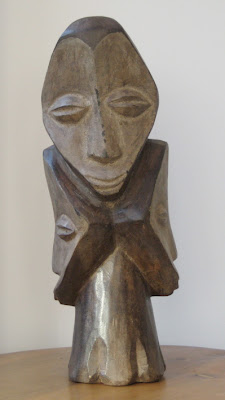African art is my calling, what is yours?

Lega Statue
These figures are usually owned by high-level members of the Bwami society. Each piece of lega art has a specific meaning and function and is used only by the initiated. These lega statues are referred to as sakimatwematwe (Many-Heads). The story goes that an elephant hunter crosses a river and sees an elephant on the other bank, he goes back to get help from the other hunters but when he returns sees that the elephant has already been killed by the others. In other words, the story shows the importance of being able to see in all directions and to be wise and fair-minded.
Sometimes when we believe so much in what we do, it's hard to find time for our loved ones or for ourselves. We all know how important our families are and also our own health and wellbeing. So, why do we find it so hard to dedicate quality time to our families and ourselves in the same way we do to our jobs and others.
It is such a beautiful and great thing to do, when we dedicate our lives to others and give them our time and energy. We make those others feel loved and cared for. But, how often do we make our loved ones feel just as loved and just as cared for? How often do we take time out to appreciate ourselves?
For the past month, I know that I have seriously concentrated on this piece of machine (my computer). "I have a deadline line to meet, we are re-designing the website and everything has got to be right", I kept telling myself and Jed. I never stopped to ask "at whose expense, have you got to meet those deadlines"? Who will pay the price for me keeping to that deadline? In my case, it was my family and myself. Now that the deadline has passed and I want to spend quality time with my family, I am much too tired to enjoy it. And, I have to wait for Jed to catch up and get off his treadmill!
In Africa the family is very important and we all know the future of our families lies in our children. It therefore, goes without saying that we need to pay special attention in the raising and teachings of our children. If we are to pay the price of feeling tired and worn out then let it be because we have dedicated quality time and energy to our families and loved ones and those others who really need it. Love and appreciate the people in your life while they are around and make sure you don't take them for granted.
Is it a coincidence that since I started writing this article, I have learned that both a customer and a supplier have been unwell? Work-life balance is very difficult for us to achieve. But, if we don't strive to achieve it, we are on our way to a slow death. We can all achieve great things but only when what we do nourishes and feeds our souls. If what we do in our day jobs doesn't live up to that, then find something that you love to create that balance.
I love what I am doing right now in my life. As you know, African art is my passion, it is my calling. Apart from the practicalities of running this business, I really like the opportunity of being able to communicate with people, whether they're customers or not. This is new to me and something that I have learned about myself since doing this business. This aspect, further nurtures my soul. I never knew I had it in me. I am three quarters of the way to surrendering to my calling. How near are you to yours?
In tribal life, one is forced to slow down, to experience the now and commune with the earth and nature. Patience is a must; no one seems to understand the meaning of "hurry up."
- Sobonfu Some



